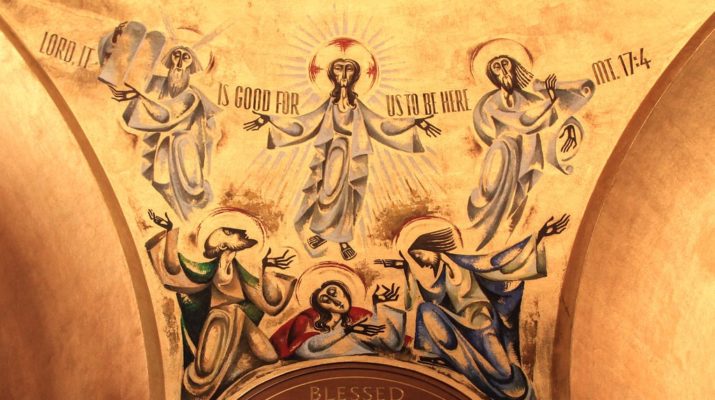Matthew 17:1-7
Transfiguration A13
1 Six days later, JesusA took with him PeterB and JamesC and his brotherD JohnE and led them up a high mountain, by themselves.
A “Jesus” = iesous. From Hebrew Yehoshua (Joshua, the Lord is salvation); {from YHVH (proper name of the God of Israel; the self-existent and eternal one); from havah (to become) or from hayah (to come to pass, become, be) + yasha (to deliver, defend, help, preserve, rescue; properly, to be open, wide or free, which implies being safe. So, in a causative sense, this is to free someone)}. This is Jesus or Joshua in Greek – the Lord saves or the Lord is salvation.
B “Peter” = petros. Related to petra (large rock that is connected and or projecting like a rock, ledge, or cliff; can also be cave or stony ground). This is Peter, a stone, pebble, or boulder.
C “James” = iakobos. From Hebrew Yaaqov (Jacob); from the same as aqeb (heel, hind part, hoof, rear guard of an army, one who lies in wait, usurper). This is James, meaning heel grabber or usurper.
D “brother” = adelphos. From a (with, community, fellowship) + delphus (womb). This is a brother in a literal or figurative sense. It is also used of another member of the Church.
E “John” = ioannes. From Hebrew yochanan (Johanan); from Yehochanan (“the Lord has been gracious”); {from YHVH (proper name of the God of Israel); from havah (to become); from hayah (to be, exist, happen) + chanan (beseech, show favor, be gracious; properly, to bend in kindness to someone with less status)}. This is John.
2 And he was transfiguredF before them, and his faceG shone like the sun, and his clothesH became dazzlingI white. 3 SuddenlyJ there appeared to them MosesK and Elijah,L talking with him.
F “transfigured” = metamorphoo. 4x in NT. From meta (with, among, behind, beyond) + morphoo (to form, shape, mold, fashion; figuratively to take on a shape that embodies inner essence) {from morphe (shape, appearance, form); perhaps from meros (part, share, portion, allotment); from meiromai (to get one’s section or allotment)}. This is changing, transforming, or transfiguring. It is a transformation that happens after being in contact or communion with something. This is where “metamorphosis” comes from.
G “face” = prosopon. From pros (at, towards, with) + ops (eye, face) {from optanomai (to appear, be seen); perhaps from horao (become, seem, appear)}. This is the face, surface, or front. It can imply presence more generally.
H “clothes” = himatia. From heima (garment) OR from ennumi (to put on). This is the outer garment, cloak, robe, or mantle. It is worn loosely over a tunic.
I “dazzling” = hos + ho + phos. Literally “white as the light.” Phos is from phao (to shine or make visible, especially with rays of light); from the same as phaino (to bring light, cause to appear, shine, become visible or clear). This is light, a source of light, fire, or radiance. This is light with specific reference to what it reveals. It is luminousness whether natural or artificial, abstract or concrete, literal or figurative.
J “suddenly” = idou. From eido (to be away, see, know, remember, appreciate). This is see! Lo! Behold! Look! Used to express surprise and or draw attention to the statement.
K “Moses” = mouses. From Hebrew Mosheh (Moses); from mashah (to pull out in a literal or figurative sense, to draw out) OR from Egyptian mes or mesu (child, son i.e. child of…). This is Moses – the one drawn out from the water, which is to say, rescued. If derived from the Egyptian, his name would share a root with Rameses and Thutmose.
L “Elijah” = Elias. From Hebrew Eliyyah (Elijah) {from el (God, god) + Yah (the shortened form of the name of the God of Israel; God, Lord); from YHVH (proper name of the God of Israel; God, Lord; the self-existent or eternal one); from havah (to become) or hayah (to be, become, happen)}. This is Elijah, “The Lord is God.”
4 Then Peter said to Jesus, “Lord,M it is goodN for us to be here; if you wish,O I will make three dwellingsP here, one for you, one for Moses, and one for Elijah.”
5 While he was still speaking, suddenly a brightQ cloudR overshadowedS them, and from the cloud a voice said, “This is my Son, the Beloved;T with him I am well pleased;U listen to him!”
M “Lord” = kurios. From kuros (authority, supremacy). This is a respectful address meaning master or sir. It refers to one who has control or power greater than one’s own. So, it was also applied to God and Jesus as Master or Lord.
N “good” = kalos. This is good, noble, beautiful, or worthy. This is external signs of goodness like beauty, demonstrations of honorable character, showing moral virtues. A different word, agathos, speaks of intrinsic good.
O “wish” = thelo. This is to wish, desire, will, or intend. It is to choose or prefer in a literal or figurative sense. It can also mean inclined toward or take delight in. It can have a sense of being ready to act on the impulse in question.
P “dwellings” = skene. Perhaps related to skeuos (vessel, tool, container, implement; also vessel in a figurative or literal sense) or perhaps related to skia (shadow, thick darkness, outline; figurative for a spiritual situation that is good or bad). This is a tent, booth, tabernacle, or dwelling. It could be a cloth hut. This is a tent in a literal or figurative sense.
Q “bright” = photeinos. Related to “dazzling” in v2. 5x in NT. From phos (see note I above). This is full of light, shining, brilliant, transparent, or well-illumined.
R “cloud” = nephele. From nephos (cloud; figurative for a great crowd or multitude). This is cloud or cloudiness.
S “overshadowed” = episkiazo. Perhaps related to “dwellings” in v4. 5x in NT – 3x in Transfiguration accounts, 1x when the angel tells Mary she will become pregnant, and 1x in Acts when people are healed when Peter’s shadow falls on them. From epi (on, upon, what is fitting) + skia (see note P above). This is to overshadow or envelop. It could also mean to capture something in a bright haze or figuratively to influence something with a supernatural force or presence.
T “Beloved” = agapetos. From agape (love, goodwill, benevolence; God’s divine love); from agapao (to love, take pleasure in, esteem; to prefer). This is Beloved or very dear one. It is a title for the Messiah, but also for Christians. Properly, this is one who personally experiences God’s love.
U “am well pleased” = eudokeo. From eu (good, well, well done) + dokeo (to have an opinion, seem, appear, suppose; a personal judgment; to think); from dokos (opinion). This is to think well of, to be pleased or resolved. Properly, this is what someone finds good or acceptable – approving of some action or generally thinking well of.
6 When the disciplesV heard this, they fell to the groundW and were overcome by fear.X 7 But Jesus came and touchedY them, saying, “Get up and do not be afraid.” 8 And when they looked up,Z they saw no one except Jesus himself alone.
9 As they were coming down the mountain, Jesus orderedAA them, “Tell no one about the visionBB until after the Son of ManCC has been raised from the dead.”
V “disciples” = mathetes. From matheteuo (to make a disciple of); from mathnao (to learn key facts, gain knowledge from experience; generally implies reflection as part of the learning process); from math– (thinking things through). This is a disciple, learner, or student. It is where we get “mathematics” from.
W “fell to the ground” = pipto + epi + prosopon + autos. Literally “fell on their face.” Prospon here is the same as “face” in v2.
X “overcome by fear” = phobeo + sphodra. Literally “terrified greatly.” Phobeo is from phobos (panic flight, fear, fear being caused, terror, alarm, that which causes fear, reverence, respect); from phebomai (to flee, withdraw, be put to flight). This is also to put to flight, terrify, frighten, dread, reverence, to withdraw or avoid. It is sometimes used in a positive sense to mean the fear of the Lord, echoing Old Testament language. More commonly, it is fear of following God’s path. This is where the word phobia comes from. Sphodra is 11x in NT. From sphodros (exceeding, very much, all out, violent). This is exceedingly, greatly, deeply. This is going all out, with total effort, done to the fullest extent.
Y “touched” = haptomai. From hatpo (to touch, handle, kindle, lay hold of). This is a touch that has an impact on what is being touched – it has an influence on the recipient so that the recipient is changed.
Z “looked up” = epairo + de + ho + ophthalmos + autos. Literally “and having lifted up their eyes.”
AA “ordered” = entellomai. 15x in NT. From en (in, on, at, by, with) + tellomai (to accomplish) {from telos (an end, aim, purpose, completion, end goal, consummation, tax; going through the steps to complete a stage or phase and then moving on to the next one)}. This is to charge, command, give orders or instructions.
BB “vision” = horama. Related to “face” in v2 & “appeared” in v3. From horao (see note G above). This is vision, spectacle, or sight. It can also be spiritual seeing – especially a supernatural vision.
CC “Man” = anthropos. Probably from aner (man, male, husband) + ops (eye, face). This is human, humankind. Used for all genders.
Image Credit: “Transfiguration of the Lord” in the upper sacristy of the Basilica of the National Shrine of the Immaculate Conception in Washington DC.




